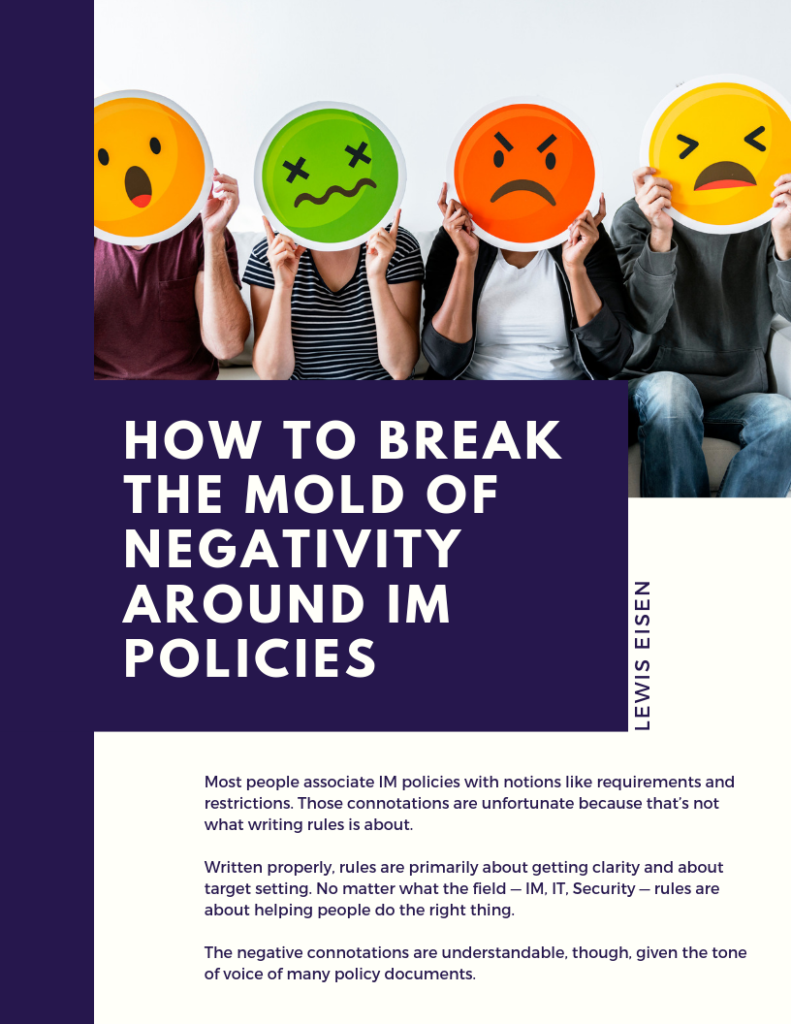How to Break the Mold of Negativity Around IM Policies

Most people associate IM policies with notions like requirements and restrictions. Those connotations are unfortunate because that’s not what writing rules is about.
Written properly, rules are primarily about getting clarity and about target setting. No matter what the field — IM, IT, Security — rules are about helping people do the right thing.
The negative connotations are understandable, though, given the tone of voice of many policy documents.
Often organizations claim to hold “respect for others” as a core value, but when you look at their rules documents, the story is different. Whether they’re called “policies,” “standards,” or simply “guidelines,” many of these rules sound as if they were written by angry parents scolding naughty children. Getting buy-in under those conditions is an uphill battle.
Compare the following policy statements:
A) ”Corporate documents must be stored in the official repositories and MUST NEVER be stored on personal storage devices.”
B) ”Corporate documents are stored exclusively in official repositories.”
These statements clearly convey the same message: we want people to store their documents in one place and not another. So why is Statement A so much longer?
Reading between the lines of Statement A, we can detect some subtle but clearly perceptible undertones. The business evidently suffers from a problem: people have not been respecting the rule until now. Moreover, it seems that the IM specialists are frustrated with that situation.
Statement B is gentler. The requirement is still strict, yet it’s expressed in a helpful rather than reproachful manner.
The person who wrote Statement A wanted to address the issue directly, but that wasn’t considered sufficient. Clearly, someone at this organization believes that employees need to be shouted at before things will improve.
In fact, compliance is more likely in an organization when the rules sound positive and helpful. After all, your policies are a reflection of your corporate culture. A policy suite full of “must,” “should,” and “no exceptions” statements is a clear indication that the organization lives under a command-and-control management style rather than a collaborative, teamwork approach.
Moreover, negatively worded statements unintentionally reveal your weaknesses to your employees and customers—both current and prospective. Seriously, does everybody really have to know that some employees have not been complying? The admonishment in the second part of Statement A is a gratuitous appendage to what can be a simply worded rule.
Most policy writers tell me that Statement A does not reflect their own communication style. They don’t talk to people in that tone of voice. It’s not who they are, and it’s not how they want to come across. They’re using harsh wording in written policies for historical reasons.
But it’s not justifiable. The strictest rules in any country, in fact, are the criminal laws — the rules against murder, assault, kidnapping … you know, the really rotten stuff. The precise wording of those rules varies from jurisdiction to jurisdiction, but the tone of voice is always the same: it’s a simple declarative sentence. Something along the lines of this: “A person who commits murder is guilty of a felony.”
There is no shouting, no finger wagging, no “we know best” parent-child dynamic. It’s a simple, respectful statement.
So the reality is that we have a situation where the strictest laws for the most heinous crimes in the country are worded more respectfully than the policies that come out of most organizations.
Ponder that for a moment. Do the people who promote Statement A really believe that murdering your boss is less serious an offense than storing corporate documents on personal devices?
It is possible to break the mold. Think of the policy statements you write not as limitations or threats, but as targets and recipes for success.
Most people in an organization truly want to do things right. The job of the policy writer is to specify what that means in a manner that’s clear, succinct, and respectful.
Well-written policies are positive and helpful.

Download the PDF version of the article.
[ls_content_block id=”957″]
[ls_content_block id=”629″]
About the Author

- Lewis S Eisen, JD CIP SIPC is the developer of the Perfect Policies™ approach to using respectful language in policy drafting, which has been adopted in organizations around the world. His international bestseller Rules: How to Write Rules that People Want to Follow, is now in its third edition and is also available in French. Lewis draws on 40 years’ experience as a practising lawyer, business consultant, and federal civil servant. Lewis was the winner of the ARMA International Britt Literary Award in 2020.




